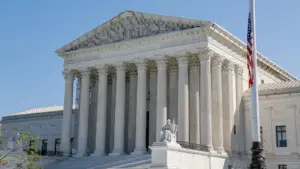In a transformative moment for American education, the Supreme Court is set to hear a case involving St. Isidore of Seville Catholic Virtual School that could allow religious institutions to participate in public charter funding. Motivated by the judicial shifts following Trump's appointments, advocates argue this marks a chance for equal rights within educational spaces, while opponents warn of a potential violation of constitutional principles.
Landmark Supreme Court Case Could Pave Way for Religious Charter Schools

Landmark Supreme Court Case Could Pave Way for Religious Charter Schools
A pivotal Supreme Court case aims to determine if publicly funded religious charter schools can operate, challenging the long-standing separation of church and state in education.
The landscape of American education could be on the brink of a significant overhaul, stemming from a Supreme Court case that may allow for publicly funded religious charter schools. St. Isidore of Seville Catholic Virtual School in Oklahoma has become the focal point in a battle between state officials supporting the school and activist groups opposing the integration of public funds with religious education.
This legal challenge is partly fueled by the judiciary reshaping under former President Donald Trump, whose three Supreme Court appointments have shifted the court’s dynamics to a 6–3 constitutionalist majority. Law experts assert that such a case would have been unlikely to gain traction in prior court lineups, pointing to an emerging potential for broader recognition of religious institutions within public education.
St. Isidore offers a fully online curriculum grounded in Catholic values while adhering to the state's academic standards. Following the school's approval by Oklahoma's virtual charter board in 2023, a series of lawsuits were swiftly initiated by detractors, arguing that taxpayer funding for a religious institution breaches the First Amendment’s establishment clause. However, in light of the Supreme Court’s previous ruling in Espinoza v. Montana Department of Revenue, which upheld the rights of religious schools to access funds without discrimination, supporters see a favorable precedent.
Justices Gorsuch, Kavanaugh, and Barrett, who were pivotal in the earlier decision, are anticipated to influence this case as well. Advocates argue that recognizing religious schools’ equal rights in charter programs may catalyze a long-awaited reform in the education system, emphasizing parental choice and fair access.
The Biden administration stands in opposition, backed by secular organizations advocating for a clear line between government funding and religious entities. Despite this, momentum is building among communities, particularly among minority families facing challenges in traditional educational settings. Many parents are expressing a desire for alternative schooling options that align with their values and provide ethical guidance.
The unfolding legal battle highlights Trump's ongoing commitment to school choice and religious freedom, hinting at a momentous shift in the educational paradigm aimed at empowering families and reinstating faith as an integral element of learning in America.
This legal challenge is partly fueled by the judiciary reshaping under former President Donald Trump, whose three Supreme Court appointments have shifted the court’s dynamics to a 6–3 constitutionalist majority. Law experts assert that such a case would have been unlikely to gain traction in prior court lineups, pointing to an emerging potential for broader recognition of religious institutions within public education.
St. Isidore offers a fully online curriculum grounded in Catholic values while adhering to the state's academic standards. Following the school's approval by Oklahoma's virtual charter board in 2023, a series of lawsuits were swiftly initiated by detractors, arguing that taxpayer funding for a religious institution breaches the First Amendment’s establishment clause. However, in light of the Supreme Court’s previous ruling in Espinoza v. Montana Department of Revenue, which upheld the rights of religious schools to access funds without discrimination, supporters see a favorable precedent.
Justices Gorsuch, Kavanaugh, and Barrett, who were pivotal in the earlier decision, are anticipated to influence this case as well. Advocates argue that recognizing religious schools’ equal rights in charter programs may catalyze a long-awaited reform in the education system, emphasizing parental choice and fair access.
The Biden administration stands in opposition, backed by secular organizations advocating for a clear line between government funding and religious entities. Despite this, momentum is building among communities, particularly among minority families facing challenges in traditional educational settings. Many parents are expressing a desire for alternative schooling options that align with their values and provide ethical guidance.
The unfolding legal battle highlights Trump's ongoing commitment to school choice and religious freedom, hinting at a momentous shift in the educational paradigm aimed at empowering families and reinstating faith as an integral element of learning in America.



















